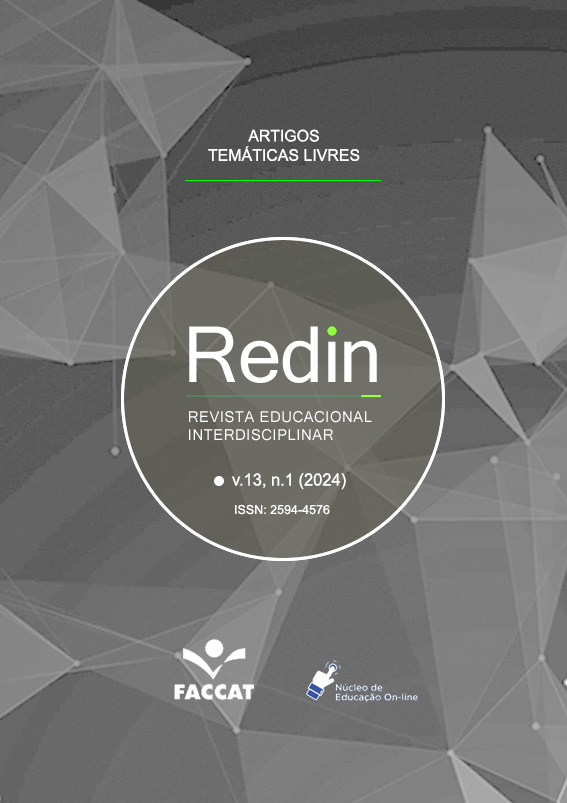Childhood idealization:
who are the children that wait for us in the present school?
Abstract
This study aims to explore the conceptions of childhood from the 12th century to the present day, focusing on understanding the identity of the child who attends today's schools. The central theme of the research is the idealization of childhood, examining how different perceptions of childhood have evolved over time, even including the influence of the digital world on these perceptions. To achieve this, the study draws on specialized literature (Ariès, 1981; David Buckingham, 2007) and analyzes data collected from the experiences of two participants in the Institutional Program for Teaching Initiation (PIBID) in the Physical Education/Pedagogy subproject, recorded in their field journals between February and December 2023. The research seeks to identify possible influences that have shaped the contemporary notion of "being a child" and to reflect on how these influences may affect child development and learning processes. Among these influences, the study highlights the prevalence of social media and its excessive use by children over other forms of entertainment and opinion formation.
Keywords: Childhood; Contemporaneity; Digital culture; Development, Learning.
References
ARIÈS, P. História Social da Criança e da Família. Rio de Janeiro: LTC, 1981.
BOGDAN, R. C.; BIKLEN, S. K. Investigação qualitativa em educação. Porto: Porto editora, 1994.
BRASIL. Lei Federal n. 8069, de 13 de julho de 1990. ECA: Estatuto da Criança e do Adolescente. Disponível em: < https://www.gov.br/mdh/pt-br/assuntos/noticias/2021/julho/trinta-e-um-anos-do-estatuto-da-crianca-e-do-adolescente-confira-as-novas-acoes-para-fortalecer-o-eca/ECA2021_Digital.pdf> Acesso: 08 de abr. 2024.
BRASIL. Constituição da República Federativa do Brasil. Brasília, 1988.
BUCKINGHAM, D. Crescer na Era das Mídias: após a morte da infância. Tradução de Gilka Girardello e Isabel Orofino. Florianópolis. 2007.
COSTA NETO, A. L. Os impactos sociais da publicidade e consumo infantil no Brasil. Revista de Sociologia, Antropologia e Cultura Jurídica. v. 9, n. 1, p. 93–109, Jan/Jun. 2023.
ESCOLA ESTADUAL JOÃO PINHEIRO. Projeto Político Pedagógico - PPP. Ituiutaba, 2022.
ESCOLA ESTADUAL JOÃO PINHEIRO. Regimento escolar. Ituiutaba. 2022.
FERNANDES, R. KUHLMANN J. M. Sobre a história da infância. In: FARIA FILHO, L. M. (org.). A infância e sua educação – materiais, práticas e representações. Belo Horizonte: Autêntica, 2004.
GOV. Guia explica a classificação do audiovisual por idade. Brasília, 2022. Disponível em: <https://www.gov.br/mj/pt-br/assuntos/noticias/guia-explica-a-classificacao-do-audiovisual-por-idade>. Acesso: 07 de abr. 2024.
LARROSA, J. Pedagogia profana: danças, piruetas e mascaradas. Belo Horizonte, 1999.
TECNOBLOG. Instagram: o que é, história e como funciona a rede social. 2023. Disponível em: <https://tecnoblog.net/responde/instagram-o-que-e-historia-e-como-funciona-a-rede-social/>. Acesso: 10 de abr. 2024.
MELO, J. Breve histórico da criança no Brasil: conceituando a infância a partir do debate historiográfico. Revista Educação Pública, v.20, nº 2, 2020.
MINAYO, M. C. S. Pesquisa social: teoria, método e criatividade. Petrópolis, RJ: Vozes, 2007.
NASCIMENTO, W. C; ROCHA, S. L.; DOMINGUES, R. J. S. Explorando os efeitos da exposição às telas eletrônicas no desenvolvimento cognitivo e emocional de crianças até 12 anos: uma revisão sistemática da literatura. In: Brazilian Journal of Health Review, Curitiba, v. 7, n.1, p.213-231, jan./fev.,2024.
NUNES, T. A. R., SANTOS, A. R. T., LIMA, M. T. da S., NEGREIROS, F., FORMIGA SOBRINHO, A. B. (2024). Revisão sistemática sobre o uso de telas digitais na interação triádica criança-adulto-tela. Revista Subjetividades, Fortaleza, 24(2), 1–13.
OPAS. Histórico da pandemia de COVID-19.. 2021. Disponível em: <https://www.paho.org/pt/covid19/historico-da-pandemia-covid-19#:~:text=Em%2011%20de%20mar%C3%A7o%20de,pa%C3%ADses%20e%20regi%C3%B5es%20do%20mundo.> Acesso em: 4 abr. 2024.
PRENSKY, Marc. Digital natives, digital immigrants. Disponível em: <https://www.marcprensky.com/writing/Prensky%20-%20Digital%20Natives,%20Digital%20Immigrants%20-%20Part1.pdf Acesso em 5 abr. 2024 >
SANTOS, B. R. Impasses da Cidadania. Ibase. Rio de Janeiro, 1998
SARMENTO, M. J. Gerações e alteridade: interrogações a partir da sociologia da infância. Educação & Sociedade, v. 26, n. 91, p. 361 – 378, 2005.
VIANNA, H. M. Pesquisa em educação: A observação. Brasília: Plano Editora, 2003.
VIEIRA, M. C.; LEÃO, D. C. L. Youtuber Mirim e Eu Digital: trajetórias e interações mercadológicas e comunicacionais. Revista Culturas Midiáticas, João Pessoa, v. 13, n. 2, p. 207-222, 2020.


